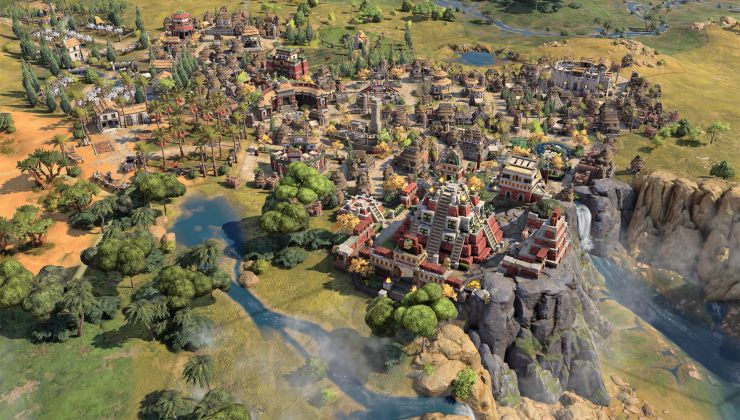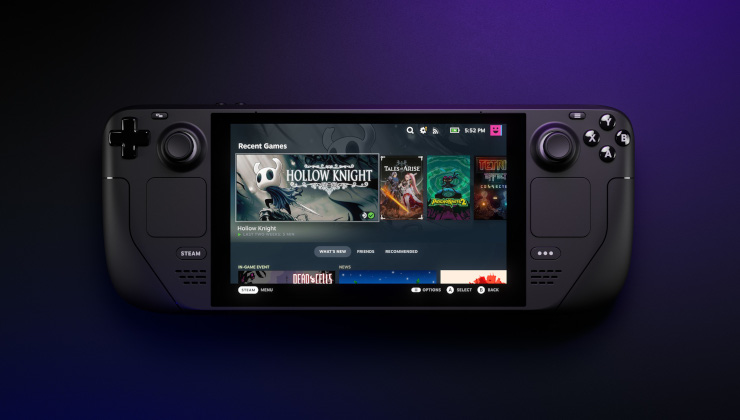Thanks to new info spotted by Chrome Unboxed, we've seen more hints of a more powerful Chromebook coming which would make for a reasonable gaming unit.
We've known for some time now that Google has been planning to get Steam on Chromebooks properly, however most existing models would lack the power needed. In the new report it seems Google are working towards a new Intel and AMD powered Chromebook with an AMD Vega 12 discrete graphics card unit (dGPU). This would definitely change things and if it arrives in time for Google's wider Steam plans, it means there would be another Linux-based device out there from a huge company capable of Linux gaming (either native Linux games or with Steam Play Proton).
You can run Steam on some existing Chrome OS devices right now, but the experience isn't the best and having it officially done by Google would ensure good compatibility.
This doesn't mean that Valve is a partner on it though, and we're not going to jump to some big speculative conclusion that it's any part of Valve's plan. Mostly because we already know Valve has their own dedicated plan with the Linux-based Steampal handheld. Update: Valve announced the Steam Deck.
As we said before in a previous article: the question is: why is it actually relevant to Linux and Linux gaming overall? Well, Chromebooks run Chrome OS which is…Linux under the Google branded hood. The version of Steam they will get is the Linux version, so they will be adding directly to the numbers of Linux users already on Steam. Part of this is because Google's Borealis uses a form of Virtual Machine that last we saw was powered by Ubuntu. Don't underestimate what that could do.
I doubt it would move mountains mind you, but Chromebooks are very popular and every little helps. I've always said hardware is what we need. Hardware on shelves in stores and in more well-known online shops, it is the missing key. There's no point having fancy marketing campaigns or extravagant plans without something to actually hook people in with. Again, it's why I think the Valve Steampal is a great idea.
But if they also start to support steam libraries then there might be a case for buying the premium versions. They would still be cheaper than premium Apple counterparts and able to run more games.
If might help "pure" Linux popularity as well if Chromebooks start to educate people that you don't need to be ripped off by Apple to have a portable pc that actually works. Though, at the same time, ever since Chromebooks I find it harder to justify installing an Ubuntu on a relative's pc given their use case. As opposed to the times when you just had to replace windows with Linux to fix every issue a year old notebook could have, with Chrome OS things just works. In my opinion there are little reasons to "upgrade" to Linux from Chrome OS if your a generic user, gaming being probably the only one until borealis takes it away.
Last edited by Mal on 15 Jul 2021 at 2:10 pm UTC
I've always said hardware is what we need. Hardware on shelves in stores and in more well-known online shops, it is the missing key.
Not just hardware in shops, although that is very important. Getting prospective customers to already have familiarity with the product so that they'll want to buy it is also very useful. Microsoft did it with business machines, so people bought the same thing to use at home. Apple and Microsoft have both tried to get a stranglehold on the education market at various times and, at the moment, Chromebooks are dominant there. With more other reasons to use them it's more likely that the cheap Chromebook they got from school could translate into a more premium Chromebook model, or a Chromebook as their own first computer, later. Google doesn't really care if it's a premium model or a cheapie, but the manufacturers will be after the higher margins and more sales. If Chromebooks expose sufficient Linuxness then the users might not be scared away from upgrading to a full Linux machine in those circumstances, since they'll already be familiar with it.
An interesting point that, and I do agree fully that familiarity sells often and quite well so if more people end up sticking with Chromebooks and it pulls more onto the Linux version of Steam - still a net win for us overall.I've always said hardware is what we need. Hardware on shelves in stores and in more well-known online shops, it is the missing key.
Not just hardware in shops, although that is very important. Getting prospective customers to already have familiarity with the product so that they'll want to buy it is also very useful. Microsoft did it with business machines, so people bought the same thing to use at home. Apple and Microsoft have both tried to get a stranglehold on the education market at various times and, at the moment, Chromebooks are dominant there. With more other reasons to use them it's more likely that the cheap Chromebook they got from school could translate into a more premium Chromebook model, or a Chromebook as their own first computer, later. Google doesn't really care if it's a premium model or a cheapie, but the manufacturers will be after the higher margins and more sales. If Chromebooks expose sufficient Linuxness then the users might not be scared away from upgrading to a full Linux machine in those circumstances, since they'll already be familiar with it.
An interesting point that, and I do agree fully that familiarity sells often and quite well so if more people end up sticking with Chromebooks and it pulls more onto the Linux version of Steam - still a net win for us overall.It was something that Microsoft exploited ruthlessly (as well as when they were starting out) during the netbook era, funding PR saying that Linux was too confusing for inexperienced users, and extending the life of XP and making it free, to starve of oxygen any low-cost competition to their desktop dominance.
Android is the most widely-used consumer OS these days, so Microsoft don't have the muscle that they used to, but people are still people so the same dynamics will apply. Sauce for the goose.
I'm wondering if SteamPal's futur OS isn't going to be ChromiumOS based... Just a tought.Valve won't want to be beholden to Google any more than they want to be beholden to Microsoft.
I'm wondering if SteamPal's futur OS isn't going to be ChromiumOS based... Just a tought.Valve won't want to be beholden to Google any more than they want to be beholden to Microsoft.
You are probably right (Liam seems to have insights that I don't
Edit: I tried Cloudready's version on a couple of old laptops. Quite lean, reactive and efficient, for what it does. It lacks the official Google Store support, though (for good or bad, depending on your perspective).
Edit2:
Based on (SteamOS)?I'm wondering if SteamPal's futur OS isn't going to be ChromiumOS based... Just a tought.Nope, absolutely not. It will be a new version of SteamOS, of that I'm 100% certain ;)
To make it clearer, I still remember PLGriffais mentionning something similar to: "We are tired of dealing with Debian tooling." on his twitter feed, if I remember correctly. So what will SteamOS "3.0" be based on?
Last edited by Mohandevir on 15 Jul 2021 at 4:01 pm UTC
'gaming laptop' is already an oxymoron, we're going to need a new descriptor for 'gaming chromebook'.Ha ha! yeah whenever I hear Gaming Laptop, I think "so an overly large chunk of laptop, that you can't ever upgrade, and will be obsolete in a year or two, assuming it doesn't overheat and die sometime before that."
'gaming laptop' is already an oxymoron, we're going to need a new descriptor for 'gaming chromebook'.Ha ha! yeah whenever I hear Gaming Laptop, I think "so an overly large chunk of laptop, that you can't ever upgrade, and will be obsolete in a year or two, assuming it doesn't overheat and die sometime before that."
and that costs 50% more than a equivalent desktop... pretty much it.
Chromebooks are already great as they are. They're cheap and they can do everything a generalist user need for a tenth of the price of an Apple counterpart.My wife has a Chromebook. And indeed, for her use case it is generally just fine. But a cheap real-Linux box would probably be better. (In theory you can probably stick Linux on my wife's Chromebook, but it looks like it's rather tricky--not like wiping a normal Windows laptop and sticking Linux on it, at all)
But if they also start to support steam libraries then there might be a case for buying the premium versions. They would still be cheaper than premium Apple counterparts and able to run more games.
If might help "pure" Linux popularity as well if Chromebooks start to educate people that you don't need to be ripped off by Apple to have a portable pc that actually works. Though, at the same time, ever since Chromebooks I find it harder to justify installing an Ubuntu on a relative's pc given their use case. As opposed to the times when you just had to replace windows with Linux to fix every issue a year old notebook could have, with Chrome OS things just works. In my opinion there are little reasons to "upgrade" to Linux from Chrome OS if your a generic user, gaming being probably the only one until borealis takes it away.
The reason has to do with Google's insistence on controlling the experience . . . and the files. This is occasionally irritating in normal use; Chromebooks will let you put a file on the machine itself or into a USB stick or whatever, but they don't want you to and they don't make it easy. Google wants you to be using Google Docs and keeping all your stuff on their cloud. They want you to barely realize your files are anywhere, they certainly don't want you to be controlling them.
This becomes a much bigger problem if something goes wrong . . . which seems to be happening increasingly as the machine gets older and Google want you to buy a new one. A while ago my wife basically lost all her files. The machine had been saying that there would be no more upgrades to the Chrome version on her machine (so she should get a new one), but then something went wrong, and in recovering there was, ironically, some kind of forced upgrade or something, and when the dust settled it had lost her files. They probably exist somewhere on some Google server, but Google said it wasn't able to restore her access or something, so for practical purposes, gone.
There are also occasional annoyances when my wife wants to do something her way rather than Google's way, or wants to do something that's not obviously part of the limited set of things Google has laid out for you to do. This doesn't come up often, but even someone who normally just browses the web, does email and creates a few documents will sometimes want to do something else. On Linux, that means either it's already installed and you check the menus, or you fire up the Software Centre or whatever and install something that does that. On a Chromebook, that means you shrug and do without what you were hoping to do.
So yeah, I think there's still a case for putting a "generic user" on Linux rather than ChromeOS.
That said, this news is still a Good Thing.
Isn't it about time they hired theI'm wondering if SteamPal's futur OS isn't going to be ChromiumOS based... Just a tought.Nope, absolutely not. It will be a new version of SteamOS, of that I'm 100% certain ;)
Ouch! This is the main reason why I will never trust saving my files to a cloud, and treat it more like a backup than where I would store things. Even then, I prefer to backup to my NAS. Also why I woyld never buy a chromebook, and prefer to just buy cheap thinkpads and throw Linux on them.Chromebooks are already great as they are. They're cheap and they can do everything a generalist user need for a tenth of the price of an Apple counterpart.My wife has a Chromebook. And indeed, for her use case it is generally just fine. But a cheap real-Linux box would probably be better. (In theory you can probably stick Linux on my wife's Chromebook, but it looks like it's rather tricky--not like wiping a normal Windows laptop and sticking Linux on it, at all)
But if they also start to support steam libraries then there might be a case for buying the premium versions. They would still be cheaper than premium Apple counterparts and able to run more games.
If might help "pure" Linux popularity as well if Chromebooks start to educate people that you don't need to be ripped off by Apple to have a portable pc that actually works. Though, at the same time, ever since Chromebooks I find it harder to justify installing an Ubuntu on a relative's pc given their use case. As opposed to the times when you just had to replace windows with Linux to fix every issue a year old notebook could have, with Chrome OS things just works. In my opinion there are little reasons to "upgrade" to Linux from Chrome OS if your a generic user, gaming being probably the only one until borealis takes it away.
The reason has to do with Google's insistence on controlling the experience . . . and the files. This is occasionally irritating in normal use; Chromebooks will let you put a file on the machine itself or into a USB stick or whatever, but they don't want you to and they don't make it easy. Google wants you to be using Google Docs and keeping all your stuff on their cloud. They want you to barely realize your files are anywhere, they certainly don't want you to be controlling them.
This becomes a much bigger problem if something goes wrong . . . which seems to be happening increasingly as the machine gets older and Google want you to buy a new one. A while ago my wife basically lost all her files. The machine had been saying that there would be no more upgrades to the Chrome version on her machine (so she should get a new one), but then something went wrong, and in recovering there was, ironically, some kind of forced upgrade or something, and when the dust settled it had lost her files. They probably exist somewhere on some Google server, but Google said it wasn't able to restore her access or something, so for practical purposes, gone.
There are also occasional annoyances when my wife wants to do something her way rather than Google's way, or wants to do something that's not obviously part of the limited set of things Google has laid out for you to do. This doesn't come up often, but even someone who normally just browses the web, does email and creates a few documents will sometimes want to do something else. On Linux, that means either it's already installed and you check the menus, or you fire up the Software Centre or whatever and install something that does that. On a Chromebook, that means you shrug and do without what you were hoping to do.
So yeah, I think there's still a case for putting a "generic user" on Linux rather than ChromeOS.
That said, this news is still a Good Thing.
Edit: [told you](https://www.gamingonlinux.com/2021/07/valve-has-formally-announced-the-steam-deck-a-portable-handheld-console-with-steamos) |:P
Lol! Fair enough... And the answer came much faster than I expected. Never been happier to be proven wrong.
Ha ha! yeah whenever I hear Gaming Laptop, I think "so an overly large chunk of laptop, that you can't ever upgrade, and will be obsolete in a year or two, assuming it doesn't overheat and die sometime before that."
and that costs 50% more than a equivalent desktop... pretty much it.
... and, maybe the most important, doesn't even work unplugged (for more than say an hour). ;)










 How to set, change and reset your SteamOS / Steam Deck desktop sudo password
How to set, change and reset your SteamOS / Steam Deck desktop sudo password How to set up Decky Loader on Steam Deck / SteamOS for easy plugins
How to set up Decky Loader on Steam Deck / SteamOS for easy plugins
See more from me